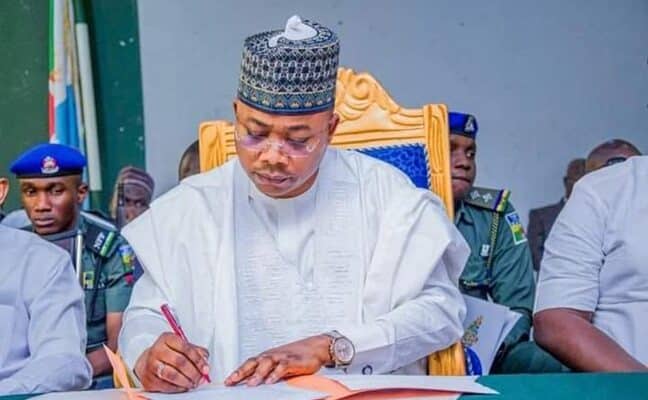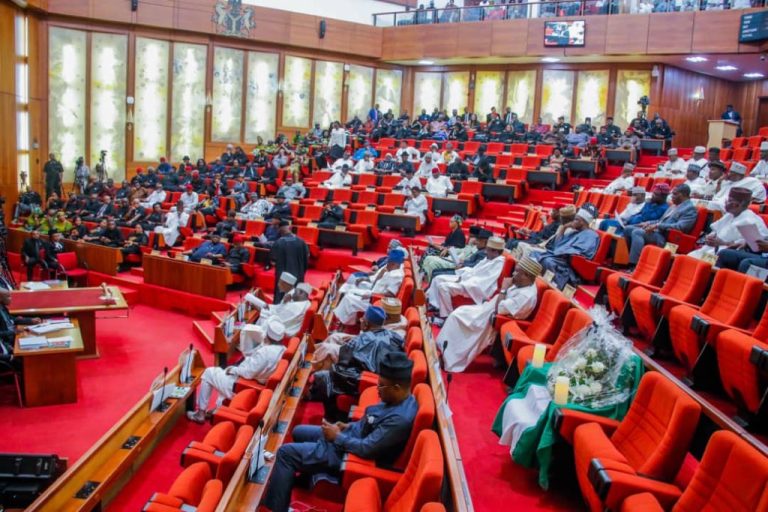The Economic and Financial Crimes Commission (EFCC) has linked the immediate-past Governor of the Central Bank of Nigeria, Godwin Emefiele, to the massive Abuja property with 753 duplexes and other apartments located in the Cadastral Zone area of the capital city.
This information was contained in court documents filed by the anti-graft agency and obtained by Punch on Tuesday.
On Monday, the EFCC had announced the recovery of the property from an unnamed ex-government top brass, describing the property as the biggest single recovery it had made in the course of fighting corruption since its establishment in 2003.
The recovery followed a ruling delivered on December 2, 2024 by Justice Jude Onwuegbuzie of the FCT High Court in Apo.
In the court documents, the EFCC ran a narration linking Emefiele to the massive property spanning 150,500 square metre and identified as Plot 109, Cadazral Zone C09, Lokogoma District, Abuja.
According to the document, Emefiele allegedly carried out “monumental fraud” as the CBN governor with his cronies to acquire several properties including the estate.
“The commission whilst investigating the alleged monumental fraud carried out by the immediate past Governor of the CBN and his cronies traced and discovered several properties reasonably suspected to have been acquired and or developed with proceeds of unlawful activities.
“The property highlighted in Schedule A to this application is one of the said properties recovered, having been reasonably suspected to have been acquired/ developed with proceeds of unlawful activities.”
The EFCC alleged that “in the cause of this investigation, it was revealed that the erstwhile CBN governor negotiated kickbacks in return for allocation of foreign exchange to some companies who were in desperate need of foreign exchange for their lawful and legitimate businesses.
“Our investigation equally revealed that erstwhile CBN Governor received kickbacks from some contractors who were awarded contracts by the Central Bank of Nigeria.”
The anti-graft agency also alleged that Emefiele connived with several cronies, including one Ifeanyi Omeke, who “ran several errands for him, which included purchase and perfection of title documents for several properties located in highbrow areas of Lagos and Abuja.”
It said the documents for the Abuja property were recovered during a search of Omeke’s office and that investigators located the property on September 17, 2024 “with the assistance of a surveyor from the Abuja Geographical Information Systems, using search results and coordinate.”
The EFCC said its investigation “revealed that the said property has been abandoned and deserted with only a guard manning the said property since June 2023 upon the arrest of the erstwhile CBN Governor. “
According to the EFCC, the massive property, allegedly acquired by Emefiele, through cronies, was originally meant for a mass housing development.
The EFCC said its investigation revealed that Emefiele used three companies to pay a total of ₦2.2bn to buy the property.
It said the seller “received the aggregate sum of N2,200,000,000.00,” adding that “the said three companies used for the payment of the property are enmeshed in criminal maneuvering of layering proceeds of illegal activities of Mr. Godwin Emiefele.”
According to the EFCC, one of the companies was used to pay ₦900m, the second paid ₦700m, while the third paid ₦600m, totalling ₦2.2bn.
It said the directors of the companies were arrested “and their statements voluntarily obtained in the course of investigation.”
“The funds used in the acquisition of the property highlighted in Schedule A to this application are not legitimate earnings of Godwin Emefiele but funds acquired through illegal and unlawful activities.
“That I know as a fact and verily believe that the source/origin of the funds used in the acquisition and/or development of the properties sought to be forfeited are proceeds of unlawful activities to wit: corrupt enrichment, receiving of gratification or kickbacks and abuse of office,” an EFCC investigator stated in the affidavit filed in court.







